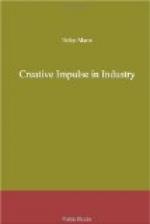The calculable effect on labor psychology may have revolutionary significance. It is quite another sort of appeal in its effect from the stereotyped and familiar one of employers to labor to feel their responsibility. That appeal never reached the consciousness of working men for the reason that it is impossible to feel responsible or to be responsible where there is no chance of bearing the responsibility. Experiencing responsibility in industry means nothing more nor less than sharing in the decisions, the determination of procedure, as well as suffering from the failure of those decisions and participating in their successful eventuation. As the governments in the present case have made their appeals to labor they have carried the suggestion of partnership in responsibility because the government is presumably the people’s voice and its needs also presumably are the common needs and not the special interests of individuals. It is hardly necessary to point out that it was not the intention of government officials who made the appeal to excite a literal interpretation; they did not expect to be taken so seriously and up to date they have not been taken more seriously than they intended by American labor. All they mean and what they expect to gain, is what employers have meant and wanted; that is labor’s surrender of its assumed right to strike on the job, its surrender of its organized time standards and its principle of collective bargaining. But when officials speak in the name of a government what they mean is unimportant; what it means to the people to have them speak, and the people’s interpretation of what they say, is the important matter.
These appeals of the governments in this time of war to the working people have the tendency to clear the environment of the suggestion that common labor, that is the wage earning class (as distinguished from salaried people, employers and the profiteers pure and simple) are incompetent to play a responsible part in the work of wealth production. A responsible part does not mean merely doing well a detached and technical job; it means facing the risks and sharing in the experimental experience of productive enterprise as it serves the promotion of creative life and the needs of an expanding civilization. As the appeals of the governments at this time bear the stamp of a nation’s will, its valuation and respect for common labor, there is the chance, it seems, that they may carry to the workers the energizing thought that all the members of the industrial group must assume, actually assume, responsibility for production, if production is to advance. Equally important in the interest of creative work is the power of these appeals to shift the motive for production from the acquisitive to the creative impulse. In the midst of the world’s emergency, driven by the fear of destruction the nations have turned instinctively to the unused creative force in human and common labor, that is to the ability of the wage earner to think and plan. If the response of labor is genuine, if with generous abandon it releases its full productive energy, it is quite certain as matters now stand that neither the governments nor the financiers are prepared to accept the consequence.




